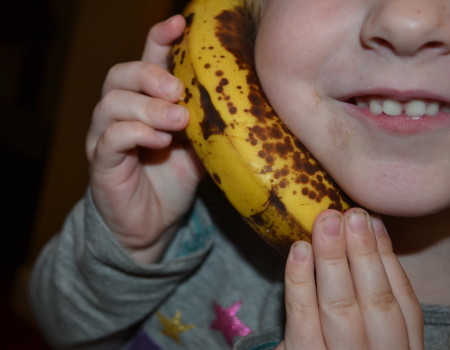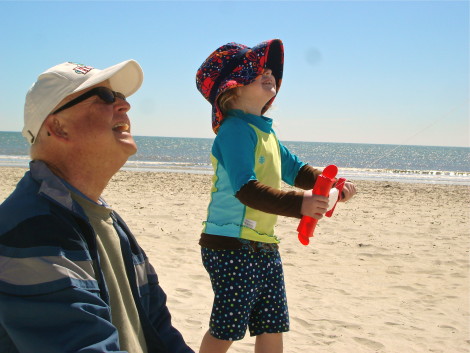When You Listen to a Child

My younger daughter and I were the first ones to arrive home from an evening swim meet. Although I knew my husband would be arriving shortly with my mom and older daughter, my heart was heavy that I had to come home first.
I had an overwhelming feeling of dread about what I might find.
My dad, who was visiting from Florida, had fallen ill that afternoon and was not able to go to the meet. Although he’d promised not to descend the stairs while we were gone, I couldn’t help but worry about my 74-year-old diabetic father during the swim meet.
That feeling of angst I’d endured for hours was now going into overdrive as my daughter and I ascended the stairs. We expected to find my dad sleeping soundly, but his bed was empty.
My perceptive child knew what she saw was not good. “Uh-oh. Where’s Paw Paw?” she asked with wide eyes and concern in her voice.
I swallowed hard.
“Oh, I am sure he is around her somewhere,” I said forcing myself to sound light-hearted even though the feeling of panic in my chest was now nearly suffocating. “Why don’t you go to your bedroom and put on your pajamas while I look for Paw Paw?” I suggested, not knowing what condition we might find my dad in.
After putting up a brief protest about wanting to help look for her grandpa, my child obliged. As soon as she reached her bedroom, I bolted down the stairs.
I immediately noticed the front door was unlocked—which was not how we left it.
My mind immediately imagined my dad wandering the neighborhood in a disoriented state or lying face down in the grass.
I quickly scanned the street and yard but saw no sign of him. Now more worried than ever, I fought the urge to scream my dad’s name like a maniac. Instead I returned to the house and searched every room.
When I’d run out of places to look, my eyes began to water. But I knew this was no time to cry or fall apart. I willed myself to stay calm, and that’s when it hit me. My dad’s favorite place to sit was the back porch. Even on the hottest afternoons in the south, my dad would sit there contentedly gazing at the trees and catching a catnap.
I raced to the backdoor and immediately felt fear’s intense grip release from my racing heart.
There sat my dad, hands folded and head bowed in peaceful slumber.
My hand hastily reached for the doorknob, but I didn’t turn it. I just stood there for a moment reciting a prayer of gratitude—thankful for one more day with my dad.
As tears of relief spilled from my eyes, words written by my dad came back in full force. I’d received an email message from him a few months into my Hands Free journey. While telling me he was proud of my decision to transform my distracted ways and be more present in my children’s lives, he had his own difficult truths to share.
“I am sorry I was distracted while raising you and your sister. I wasn’t as Hands Free as I could have been. I am deeply sorry for that. I hope you always knew how much I love you,” he wrote.
My dad didn’t go into detail about what he was sorry for—he didn’t need to. I knew. I remember.
But I remember something more.
I remember walking across campus to my dad’s office everyday after school for over a decade. And upon my arrival, I would find my dad sitting at his desk amid piles of papers and books.
Although the empty chair sitting beside him was probably for a colleague in need of curriculum guidance or a college student seeking scheduling assistance, I always believed that empty chair was for me.
Dad would look up from whatever he was doing and greet me with a smile. Then, as if on cue, he’d place the cap on the black felt tip pen he always used to grade papers or draft notes. The pen cap gesture was my signal. It meant my dad wanted to hear about my day. Sometimes I told him a few things, other times I went on and on about something exciting or dramatic that happened at school.
This was the routine. From first grade through my senior year in high school, I had after school chats with my dad. I can’t remember a time when he said he couldn’t talk right now—even when he was working on his dissertation, dealing with difficult faculty issues, or facing budget cuts. When I spoke, my dad was there. All there.
My dad wasn’t perfect. He lost his temper sometimes. He worked too much. He experienced periods of depression. But even through the rough patches, my dad always listened to me.
My dad was never too busy, too distracted, or too desolate to listen to what I had to say.
Even in the rough patches.
And despite what the critics say—that giving a child our undivided attention creates a child who thinks the world revolves around him or her—I believe otherwise.
Having a parent that listens creates a child who believes he or she has a voice that matters in this world.
And when you believe your voice matters, you have the strength to say, “Let me out of the car,” when you feel like you are in a dangerous situation.
When you believe your voice matters, you have the courage to say no to harmful substances that can affect your ability to make decisions and prematurely end your life.
When you believe your voice matters, you have the bravery to admit you made a mistake and will use that experience to learn, grow, and do better next time.
When you believe your voice matters, you have the confidence to write down your most difficult truths and publish them in a book so someone else doesn’t feel alone in his or her struggles.
In these moments I could have suffered in silence, but instead I spoke up. Why? Because my dad listened to me as I grew.
And what this means is there is hope, great hope, for anyone struggling today.
My friends, perfection is not expected on this parenting journey.
You will have days when you are dealing with heavy, soul-crushing issues.
You will have days when nothing you do seems to be good enough.
You will have days when smiles don’t come easily and harsh words are spoken too quickly.
You will have days when you can only do the basics and nothing more.
On those days, I urge you not to say things like, “I am a failure,“ or “I am a bad parent.”
Instead, I urge you to garner the strength, the patience, the resolve to do one thing … just one thing.
Listen.
Listen when she wants to tell you the (many) reasons she chose the pink shoes instead of the red ones.
Listen when he tells you (in agonizing detail) how he built his giant Lego skyscraper.
Listen when she tells you how that pesky ant made that (barely visible) mark on her arm.
Listen when he confesses he is struggling in Mr. Johnson’s pre-algebra class.
Listen when she reveals her fear of being bullied on the bus.
Listen when he admits you are his only hope.
Listen with your eyes, ears, and heart. They know. They know when you are listening. And it matters; it really matters.
Because someday our children will find themselves in a difficult situation and they’ll have a choice—either to suffer in silence or speak up. And perhaps that is the moment they will remember your eyes, the nodding of your head, your thoughtful response. And suddenly they will be reminded that their voice holds value.
And when you believe your voice holds value … well, let’s just say, that belief can make a life changing difference.

my all-time favorite picture of my dad doing what he does best …
listening and loving!
Found the story here:


No comments:
Post a Comment